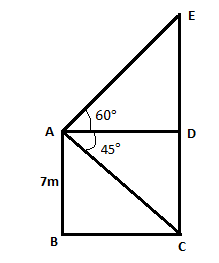Question
Question: Find the top of a \[7m\] height building, the angle of elevation of the top of a tower is \[{60^\cir...
Find the top of a 7m height building, the angle of elevation of the top of a tower is 60∘ and angle of depression of the tower is 45∘. Find the height of the tower.
Solution
This sum is solved by using trigonometry, in this section, we will see how trigonometry is used for finding the heights and distances of various objects without actually measuring them.
Here they give an angle of elevation, it is an angle formed by the line of sight with the horizontal when the point being viewed is above the horizontal level, that is, the case when we raise our head to look at the object.
The angle of depression is an angle formed by the line of sight with the horizontal when the point is below the horizontal level, that is, the case when we lower our head to look at the point being viewed.
Complete step-by-step answer:
It is given the angle of elevation is 60∘ and the angle of depression is 45∘

Let the building be AB and tower be CE
Also given that the height of building = AB=7m
From the top of building angle of elevation of top of tower=60∘
∠EAD=60∘
Angle of depression of the foot of the tower=45∘
∠CAD=45∘
We need to find height of tower
That is, CE
Collect all the possible information from the diagram for the sum
AB is parallel to CE
Since AB and CD are also parallel.
CD=AB=7m
Also,
AD and BC are parallel
So we can write AD=BC
Since tower and building are vertical to the ground
∠ABC=90∘ and ∠EDA=90∘
Since, AD and BC are parallel,
So we take AC as transversal
∠ACB=∠DAC (alternate angles)
∠ACB=45∘
In right angle triangleABC,
tanC=side adjacent to angle Cside opposite to angle C
tan45∘=BCAB
Here the value of tan45∘=1
1=BCAB
AB=7m
1=BC7
BC =7m
Since we have to know that BC=AD
So, AD=7m
Now, in a right angle triangleADE,
tanA=side adjacent to angle Aside opposite to angle A
tan60∘=ADED
Here, tan60∘=3
3=ADED
3=7ED
73=ED
ED=73m
Hence, height of tower = CE
In the diagram we can say that CE=CD+DE
Already we have the value of CD=7m and ED=73m
So we can write it as,
CE=73+7
Height of tower=7(3+1)m
Note: The process of finding heights and distances is the best example of applying trigonometry in real life situations.
Here some uses,
It is used in oceanography in calculating the height of tides in oceans.
The sine and cosine functions are fundamental to the theory of periodic functions, those that describe the sound and light waves.
